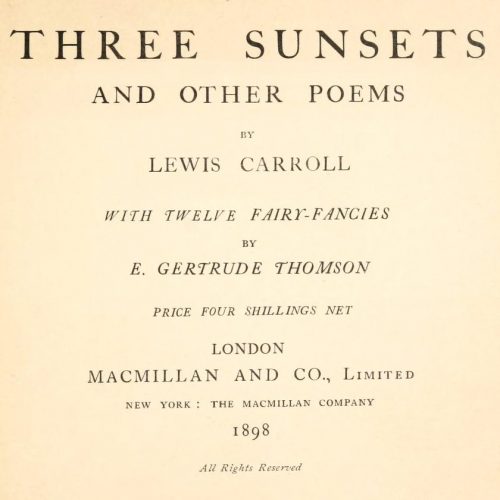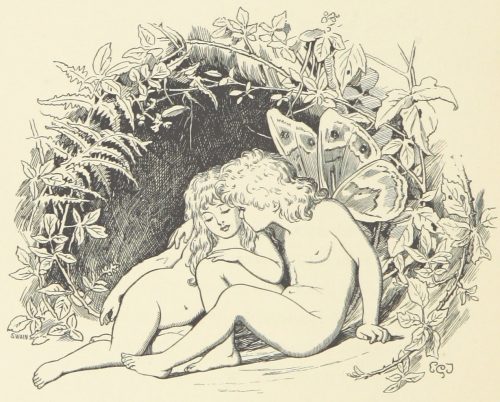The Valley of The Shadow of Death Poem by Lewis Carroll (Charles Dodgson)
Poetry from Three Sunsets and Other Poems.
The Valley of The Shadow of Death Poem
Hark, said the dying man, and sighed,
To that complaining tone—
Like sprite condemned, each eventide,
To walk the world alone.
At sunset, when the air is still,
I hear it creep from yonder hill:
It breathes upon me, dead and chill,
A moment, and is gone.
My son, it minds me of a day
Left half a life behind,
That I have prayed to put away
For ever from my mind.
But bitter memory will not die:
It haunts my soul when none is nigh:
I hear its whisper in the sigh
Of that complaining wind.
And now in death my soul is fain
To tell the tale of fear
That hidden in my breast hath lain
Through many a weary year:
Yet time would fail to utter all—
The evil spells that held me thrall,
And thrust my life from fall to fall,
Thou needest not to hear.
The spells that bound me with a chain,
Sin’s stern behests to do,
Till Pleasure’s self, invoked in vain,
A heavy burden grew—
Till from my spirit’s fevered eye,
A hunted thing, I seemed to fly
Through the dark woods that underlie
Yon mountain-range of blue.
Deep in those woods I found a vale
No sunlight visiteth,
Nor star, nor wandering moonbeam pale;
Where never comes the breath
Of summer-breeze—there in mine ear,
Even as I lingered half in fear,
I heard a whisper, cold and clear,
“This is the gate of Death.
“O bitter is it to abide
In weariness alway:
At dawn to sigh for eventide,
At eventide for day.
Thy noon hath fled: thy sun hath shone.
The brightness of thy day is gone:
What need to lag and linger on
Till life be cold and gray?
“O well,” it said, “beneath yon pool,
In some still cavern deep,
The fevered brain might slumber cool,
The eyes forget to weep:
Within that goblet’s mystic rim
Are draughts of healing, stored for him
Whose heart is sick, whose sight is dim,
Who prayeth but to sleep!”
The evening-breeze went moaning by,
Like mourner for the dead,
And stirred, with shrill complaining sigh,
The tree-tops overhead:
My guardian-angel seemed to stand
And mutely wave a warning hand—
With sudden terror all unmanned,
I turned myself and fled!
A cottage-gate stood open wide:
Soft fell the dying ray
On two fair children, side by side,
That rested from their play—
Together bent the earnest head,
As ever and anon they read
From one dear Book: the words they said
Come back to me to-day.
Like twin cascades on mountain-stair
Together wandered down
The ripples of the golden hair,
The ripples of the brown:
While, through the tangled silken haze,
Blue eyes looked forth in eager gaze,
More starlike than the gems that blaze
About a monarch’s crown.
My son, there comes to each an hour
When sinks the spirit’s pride—
When weary hands forget their power
The strokes of death to guide:
In such a moment, warriors say,
A word the panic-rout may stay,
A sudden charge redeem the day
And turn the living tide.
I could not see, for blinding tears,
The glories of the west:
A heavenly music filled mine ears,
A heavenly peace my breast.
“Come unto Me, come unto Me—
All ye that labour, unto Me—
Ye heavy-laden, come to Me—
And I will give you rest.”
The night drew onward: thin and blue
The evening mists arise
To bathe the thirsty land in dew,
As erst in Paradise—
While, over silent field and town,
The deep blue vault of heaven looked down;
Not, as of old, in angry frown,
But bright with angels’ eyes.
Blest day! Then first I heard the voice
That since hath oft beguiled
These eyes from tears, and bid rejoice
This heart with anguish wild—
Thy mother, boy, thou hast not known;
So soon she left me here to moan—
Left me to weep and watch, alone,
Our one beloved child.
Though, parted from my aching sight,
Like homeward-speeding dove,
She passed into the perfect light
That floods the world above;
Yet our twin spirits, well I know—
Though one abide in pain below—
Love, as in summers long ago,
And evermore shall love.
So with a glad and patient heart
I move toward mine end:
The streams, that flow awhile apart,
Shall both in ocean blend.
I dare not weep: I can but bless
The Love that pitied my distress,
And lent me, in Life’s wilderness,
So sweet and true a friend.
But if there be—O if there be
A truth in what they say,
That angel-forms we cannot see
Go with us on our way;
Then surely she is with me here,
I dimly feel her spirit near—
The morning-mists grow thin and clear,
And Death brings in the Day.
April, 1868.
The Valley of The Shadow of Death Poem End
Lewis Carroll – Three Sunsets Poem
Lewis Carroll – The Path of Roses Poem
Lewis Carroll – The Valley of The Shadow of Death Poem
Lewis Carroll – Solitude Poem
Lewis Carroll – Far Away Poem
Lewis Carroll – Beatrice Poem
Lewis Carroll – Stolen Waters Poem
Lewis Carroll – The Willow-Tree Poem
Lewis Carroll – Only A Woman’s Hair Poem
Lewis Carroll – The Sailor’s Wife Poem
Lewis Carroll – After Three Days Poem
Lewis Carroll – Faces in The Fire Poem
Lewis Carroll – A Lesson in Latin Poem
Lewis Carroll – Puck Lost and Found Poem
Lewis Carroll – A Song of Love Poem













